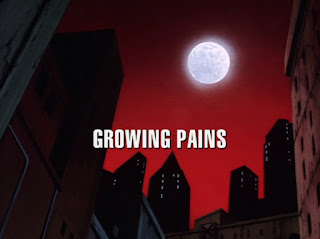 “It’s not you. I have to keep moving. There’s a man after me.”
“It’s not you. I have to keep moving. There’s a man after me.”After Robin saves a young girl (Francesca Marie Smith) from a street gang, he learns that her identity is something of a mystery. She doesn’t know her name – Robin dubs her “Annie” until they can learn more – and all she remembers is that she’s being pursued by a frightening man. Meanwhile, Batman’s investigation into a violent robbery intersects with Robin’s case when the heroes realize that this new robber is the man shadowing Annie.
Paul Dini gets a story credit on this episode, but I don’t feel he must have done very much on this one beyond pitching the basic outline to Robert Goodman, who pulls solo duty as script writer. It seems there are a few really interesting ideas in this episode, but I don’t sense that they’re given full attention in a plot that meanders and fumfers around until Batman figures out what’s going on.
There’s a nugget of a really good idea in this episode – that Robin sees Annie as something of a kindred spirit because they have similar backgrounds. “My dad wasn’t much of a prize either,” he tells her in a surprisingly sober emotional moment. It’s the kind of key character detail that was lost in “Sins of the Father” when it could have formed the backbone of a “Robin’s Reckoning”-style episode. We certainly start to get a better handle on Tim Drake as an emotional Boy Wonder, perhaps governed more by his passions than Dick Grayson ever was. If he came off as bratty in his debut and more or less neutral in the episodes since, “Growing Pains” gives us a strong sense of Tim’s personality, his dedication to his moral center, and his willingness to butt heads with Batman (something we glimpsed, to great success, in “Never Fear”).
But the largely chaste budding romance between Robin and Annie is a bit, pardon the pun, muddied by the fact that she’s revealed to be – spoilers ahead – an amnesiac piece of Clayface, sent off into the world after the events of “Mudslide” to scope out whether the coast was clear. All along, this series has blurred the line when it comes to its villains being pure evil; most if not all of them have very sympathetic reasons for doing what they do, and most villains have recognizable goals coming from deep cores in their psyches. Clayface already had the subtlety from “Feat of Clay,” in which we saw his addiction to the Renuyu cream drive him into madness. I don’t think he’s any more sympathetic when we see him as a preadolescent girl of the streets, much less when Robin appears to fall in love with Annie. The whole thing becomes a little uncomfortable, and Robin’s reaction to Annie becomes somewhat comical when we know she’s made of mud.
To top it off, “Growing Pains” continues the uncomfortable evolution of Batman into a cranky and abortive father figure. He’s curt and abrasive with Tim, perhaps giving us a hint as to why Dick left (again, spoilers – that’s exactly why he left), and worse yet he’s largely uninterested in Annie until he learns that she’s part of Clayface. Poor Kevin Conroy is saddled with the line “I know who Daddy is,” which he delivers with his nonpareil gravitas, but the absurdity of the dialogue deflates the tension of a second-act commercial break. Alfred catches some plot shrapnel too, first reminding Batman that Tim is a child before reacting with horror to learn that Batman is doing the responsible thing by tracking his protégé’s movements. Either Bruce and Alfred have become the world’s worst father figures – which, in a real sense, Bruce usually is – or they’ve been bludgeoned by a plot so peculiar that they can’t help but be warped.
Indeed, in an episode littered with faltering fathers, there’s a joke, surprisingly unsuccessful in its execution, in which Commissioner Gordon calmly observes that he’s “Glad my Barbara’s past her wild years.” It’s a decent enough gag (even though I’ve always maintained that Gordon winks at his daughter’s cape-and-cowl discords), but Batman pulls the most surprised face you’ll ever see him make, the visual equivalent of a record scratch straight out of a trailer for a mid-1990s teen comedy. It’s one of many moments in the episode where I genuinely don’t know what tone Goodman and Dini were trying to set.
The episode’s coda, in which Batman grimly intones, “Sometimes there are no happy endings,” is a fitting end for a strange episode, capped off by Robin’s oddly stubborn insistence that Clayface murdered Annie. Maybe once puberty settles in, Robin will look at “Growing Pains” differently; he doesn’t seem to be thinking clearly, and Batman doesn’t seem to understand at all what his young ward is going through. Seeing as how Batman himself had a strange adolescence, deprived of a normal childhood with normal childhood interactions, you’d think he might have a little more compassion. It’s ultimately a misfire for the otherwise usually impeccable Paul Dini, but at least it’s an uncompromising swing for the fences. It also seems to be one of the more divisive episodes of the series – fans either love this one (Dustin Nguyen, a top Bat-artist, frequently tosses Annie into his crowd scenes) or they’re unsettled by it. Count me among the latter – the fantasy of Batman is that he’s the best surrogate father a young boy could want, not an emotionally stunted absentee patriarch.
Original Air Date: February 28, 1998
Writers: Paul Dini and Robert Goodman
Director: Atsuko Tanaka
Villain: Clayface (Ron Perlman)
Next episode: “Love is a Croc,” in which Baby-Doll has her first big girl crush.
🦇For the full list of The New Batman Adventures reviews, click here.🦇

No comments:
Post a Comment